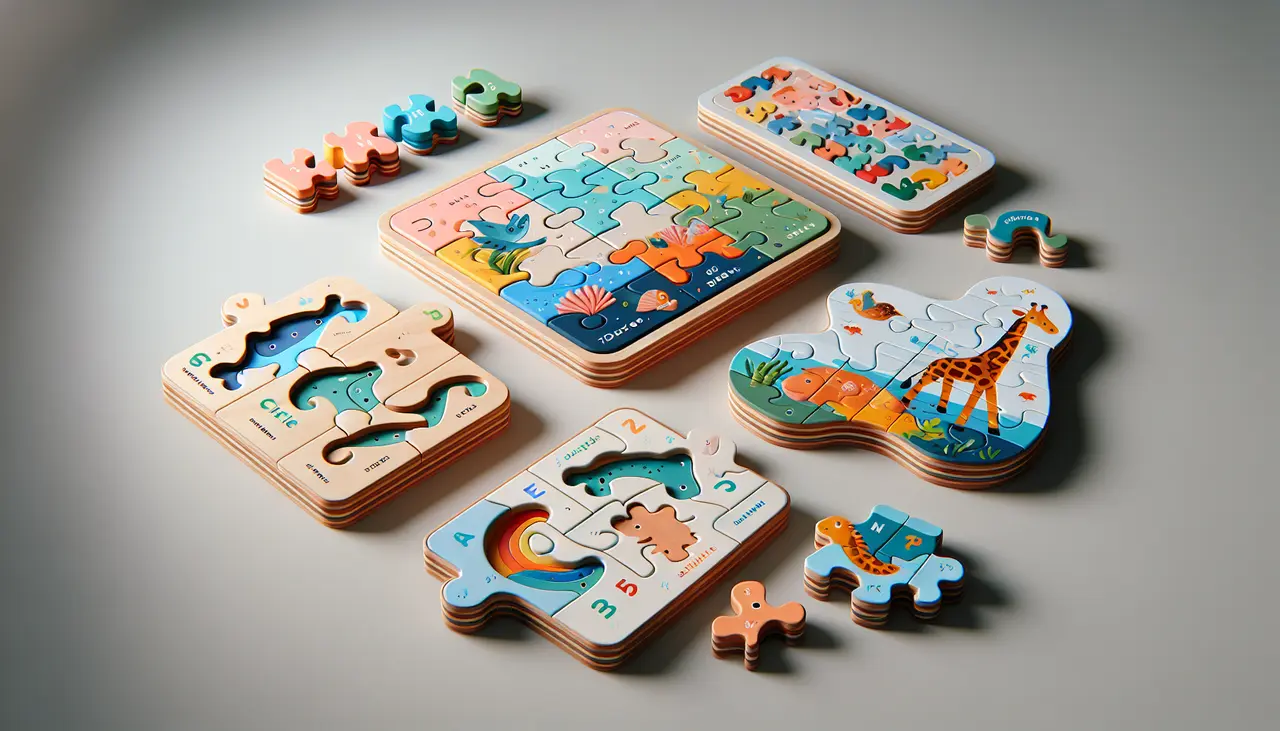Introduction to Cognitive Development in Toddlers
Cognitive development in toddlers is all about how they think, explore, and figure things out. It’s the process where young kids learn to solve problems, make sense of the world around them, understand the concept of cause and effect, and develop memory and thought processes. This stage is crucial because it sets the foundation for their learning and intelligence later in life. Puzzles play a significant role here. They are not just toys but powerful tools that encourage toddlers to use their senses, think critically, and improve hand-eye coordination. By solving puzzles, toddlers learn to identify shapes, colors, and patterns, which are basic skills needed for reading, writing, and math. Plus, the satisfaction of placing the right piece in a puzzle boosts their confidence and motivates them to tackle more challenges. So, integrating puzzles into playtime is not only about keeping them occupied but also about enhancing their cognitive skills in a fun and engaging way.
The Importance of Puzzle Play for Toddlers
Playing with puzzles is more than just fun for toddlers; it’s a key activity that boosts their cognitive development. This means it helps their brains grow stronger, making it easier for them to solve problems, understand concepts, and develop critical thinking skills as they grow. When toddlers work on a puzzle, they learn to recognize shapes, colors, and patterns. This is their first step toward understanding how different pieces fit together, an essential skill not just in school but in everyday life. Plus, as they pick up, move, and fit pieces together, they are also improving their fine motor skills, which are crucial for writing, dressing, and other important tasks. Puzzle play encourages patience and perseverance, too. Every time they find where a piece goes, they get a boost of confidence and satisfaction, teaching them the value of sticking with a task to enjoy the results. So, introducing puzzles to toddlers isn’t just playtime; it’s setting the foundation for a lifetime of learning and success.
Toddler Puzzle #1: Shape Sorters
Shape sorters are a classic for a reason. They’re not just toys but tools that spark the growth of a toddler’s mind. Picture this: your little one, with a shape in hand, scanning over the different holes until—aha!—they find the right one. This moment is more than success; it’s a step in cognitive development. Shape sorters help toddlers recognize different shapes and colors, improving their problem-solving skills. They learn the art of matching and the joy of fitting the right piece into the right spot. It’s hands-on learning at its best, teaching toddlers about spatial relationships and fine-tuning their motor skills. By pushing those shapes through the matching holes, they’re not just playing; they’re gearing up their brains for more complex tasks down the road. It’s simple, it’s effective, and it’s fun. That’s the beauty of shape sorters.
Benefits of Shape Sorters for Cognitive Growth
Shape sorters are much more than just fun playtime toys. They’re powerful tools for a toddler’s cognitive growth. Through the simple act of matching shapes and fitting them into the correct slots, toddlers learn to identify and differentiate between shapes and colors. This process sharpens their problem-solving skills because they have to think about which piece fits where. As they twist and turn the shapes to make them fit, they’re also improving their fine motor skills. Additionally, playing with shape sorters can boost a toddler’s spatial awareness and logical thinking. These toys offer a hands-on experience in understanding concepts like size, shape, and matching, which are foundational for mathematics and logical reasoning skills later in life. So, while it might just look like play, toddlers using shape sorters are laying down the building blocks for critical thinking and problem-solving abilities.
Toddler Puzzle #2: Simple Jigsaw Puzzles
Simple jigsaw puzzles are perfect for young minds. They’re not just pieces of cardboard; they’re tools for growth. Think about when you see a toddler fitting those pieces together. It’s more than just play. They’re learning. Each piece they fit, they solve a small part of a bigger picture. It teaches them about shapes, how different pieces can come together to make a whole. And there’s more. Handling those pieces? It’s good for their little fingers. Builds fine motor skills. And patience? They learn that too. Waiting, trying, maybe failing, and trying again. That teaches persistence. These puzzles, they don’t need to be fancy or expensive. Even simple ones with a few pieces do the trick. They get the toddlers thinking, solving, and growing. Simple jigsaw puzzles, they’re like a workout for the toddler brain.
How Jigsaw Puzzles Enhance Problem-Solving Skills
Jigsaw puzzles are not just a way to keep toddlers busy; they’re powerful tools for brain development. They make kids think hard as they figure out where each piece should go. This process boosts problem-solving skills in a big way. It teaches toddlers to recognize shapes, colors, and patterns. These are the building blocks for understanding more complex concepts later on. By trying out different pieces, they learn trial and error, a critical aspect of learning. Every time a piece fits, it’s a small win for them, boosting their confidence and persistence. So, when they tackle bigger challenges in life, they’re equipped with the mindset to keep trying until they succeed. Jigsaw puzzles show kids that problems can be broken down into smaller, manageable parts, a crucial lesson for any learner.
Toddler Puzzle #3: Pegboard Puzzles
Pegboard puzzles are fantastic for toddlers. Imagine a board filled with holes where kids can place colorful pegs. It’s simple but powerful. These puzzles help toddlers with a couple of key skills. First, they work on fine motor skills. Each time your toddler grabs a peg and places it in the hole, they’re practicing precise movements. This is crucial for their development. Second, they enhance problem-solving skills. Figuring out where each peg goes or creating a specific pattern requires thinking and planning. Pegboard puzzles are also great for teaching colors and counting. As toddlers play, you can talk about the different colors of the pegs or count them as they place them on the board. This makes learning interactive and fun. Plus, these puzzles adapt as your child grows. They start simple, but as your toddler gets older, you can introduce more complicated patterns to keep challenging them. It’s like having a puzzle that grows with them.
Pegboard Puzzles and Fine Motor Skill Development
Pegboard puzzles aren’t just fun; they’re a building block for your toddler’s development. These puzzles involve a board and pegs which your child matches and places into the correct slots. It’s more than play. This activity boosts your little one’s fine motor skills. Think of it as workout for tiny fingers, helping them get strong and skilled in gripping and manipulating objects. Every time your child grasps those pegs, they’re also learning about spatial relationships and problem-solving, key steps in cognitive development. Plus, it’s a game they can master at their own pace, offering a sense of achievement. So, while it looks like simple play, pegboard puzzles are paving the way for critical developmental milestones.
Toddler Puzzle #4: Matching and Memory Games
Matching and memory games are a hit with toddlers. They’re simple yet pack a massive punch for brain development. Think of them as a gym for the brain. By matching shapes, colors, or pictures, toddlers boost their ability to recognize patterns—an essential skill for learning. Memory games crank this up a notch. They challenge toddlers to remember where specific images are, improving both memory and concentration skills. With each game, toddlers learn to pay more attention and recall information, which is fantastic for their growing brains. These games typically come in colorful designs, making the learning process not just educational but super fun. Plus, they’re great for bonding time. So, when you pick a matching or memory game, you’re not just giving your toddler a game. You’re giving them a tool that sharpens their mind while they have a blast.
Improving Memory and Recognition with Toddler Puzzles
Toddler puzzles aren’t just toys; they’re brain boosters. When kids work on puzzles, they’re doing more than just matching shapes. They’re giving their memory a workout. Every time they remember where a piece fits, they’re strengthening their brain. Recognition gets a big boost too. Toddlers learn to recognize colors, shapes, and eventually, the big picture of the puzzle itself. It’s like their brain is doing push-ups, getting stronger with each piece. And the best part? They think it’s all play. They don’t even realize they’re turning into mini brainiacs with every puzzle they solve. So, next time you see them figuring out where that stubborn puzzle piece goes, remember, it’s more than just play; it’s a brain-building session.


